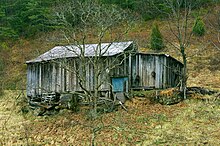Shack
This articleneeds additional citations forverification.(October 2018) |

Ashack(or, in some areas,shanty) is a type of small shelter or dwelling, often primitive or rudimentary in design and construction.
Unlikehuts,shacks are constructed by hand using available materials; however, whereas huts are usually rural and made of natural materials (mud, rocks, sticks, etc.) shacks are generally composed ofscavengedman-made materials like abandonedconstruction debris,repurposed consumer waste and other useful discarded objects that can be quickly acquired at little or no cost and fashioned into a smalldwelling.
Background
[edit]In areas of highpopulation densityand high poverty, shacks are often the most prevalent form of housing; it is possible that up to a billion people worldwide live in shacks.[1]Fire is a significant hazard in tight-knit shack settlements.[2]Settlements composed mostly or entirely of shacks are known asslumsorshanty towns.
InAustralian English,shackcan also refer to a small holiday house with limited conveniences, for instance it may not have running water or electricity.
In Canadian oilfield drilling, a shack can also be the word for a wellsite trailer. These structures are notorious among oilfield workers for being cramped, uncomfortable and generally unpleasant to be in.
In the 19th and early 20th centuries,tar paper shacksconsisting of wooden frames covered withtar paperwere a common form of very low-cost housing in the rural United States and Canada.[3][4]
Cultural role in freethought
[edit]In the frontier history of the United States,freethinkershave often used shacks—small, rundown buildings or structures—as a place to develop new ideas outside the literal confines of the establishment. Professor Michael Lannoo and science writer and editor Eric Engles note the role of shacks in American culture as simple structures that "allow an uncluttered perspective on life's larger questions". Lanoo writes that shacks played a large role in the development of environmental and ecological ideas and philosophy in the United States, allowing people to interact with and investigate nature at a closer level, particularly in the work ofHenry David Thoreau,John Muir,Aldo Leopold,andEd Ricketts.These shacks also served as a meeting place for like-minded people.[5]
Gallery
[edit]-
Shacks inKayamandi,South Africa
-
In relatively affluent areas, shacks are often used for storage or have been abandoned.
-
Shacks ofDamara peoplewithinNamibDesert
-
Shack near railway line
-
Tar paper shack in the United States, 1930s
See also
[edit]References
[edit]- ^Planet of Slums, Verso, 2006
- ^A Big Devil in the Jondolos: A report on shack fires by Matt Birkinshaw
- ^"Tar paper shack in Minnesota cut-over area, Beltrami County, Minnesota".Library of Congress.
- ^"Flashback Friday: Carrie Ingalls & Her Tar Paper Shack".
- ^Lanoo, Michael J. (2010).Leopold's Shack and Ricketts's Lab.University of California Press. pp. 1-7;ISBN9780520946064.OCLC646788647.









